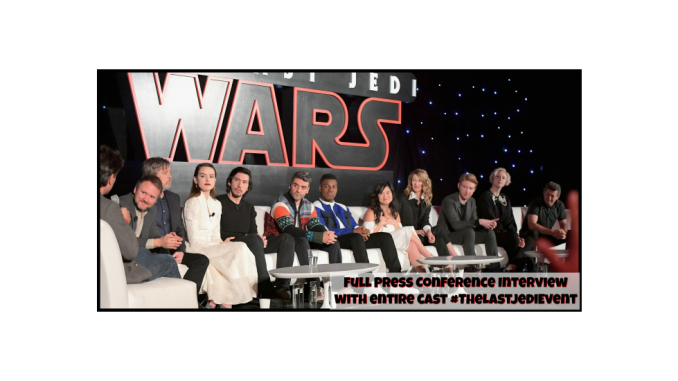
It was such an awesome experience to be part of the cast of The Last Jedi interview during the Star Wars: The Last Jedi press conference. Check out Mark Hamill (“Luke Skywalker”), Daisy Ridley (“Rey”), John Boyega (“Finn”), Oscar Isaac (“Poe Dameron”), Adam Driver (“Kylo Ren”), Domhnall Gleeson (“General Hux”), Gwendoline Christie (“Captain Phasma”), Andy Serkis (“Supreme Leader Snoke”), Laura Dern (“Vice Admiral Amilyn Holdo”), Kelly Marie Tran (“Rose Tico”) and Director Rian Johnson in my Facebook live coverage.
Cast of The Last Jedi Interview
The press conference was hosted by Anthony Breznican. He writes for Star Wars for Entertainment Weekly. He started off with a great question, you can find most of the interview that is posted above right here to read. Grab a cup of coffee, (or wine) and prepare yourself for a fun interview. It’s a great way to prepare yourself for the release of the film this week.
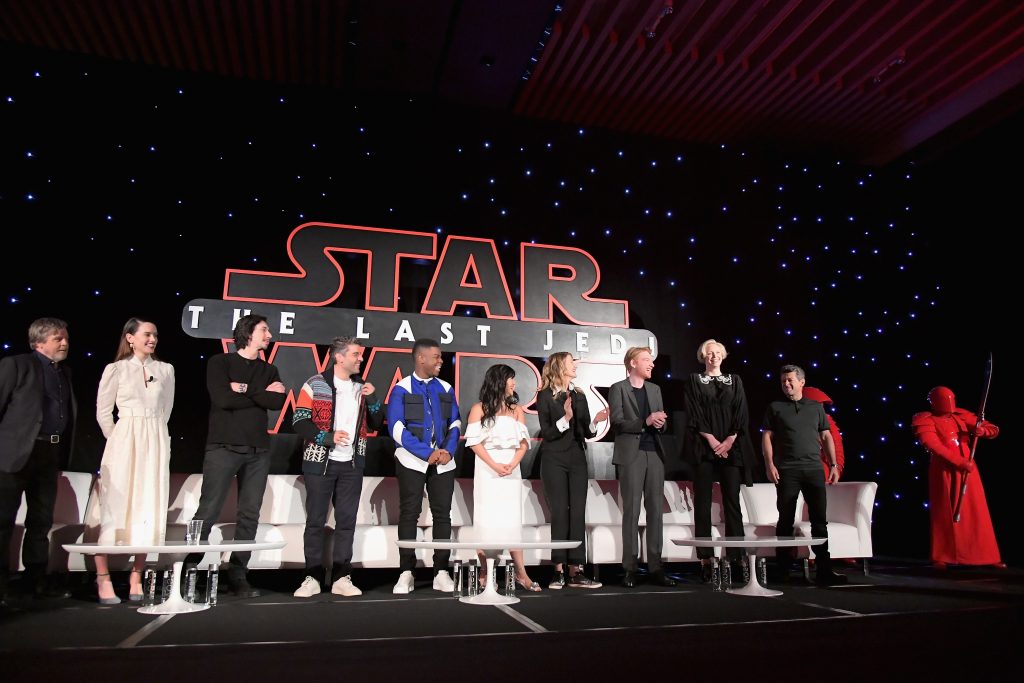
Rian Johnson; Mark Hamill; Daisy Ridley; Adam Driver; Oscar Isaac; John Boyega; Kelly Marie Tran; Laura Dern; Domhnall Gleeson; Gwendoline Christie; Andy Serkis
This is a sequel to The Force Awakens but it’s also Episode 7 in a series. So Rian, what would you say differentiates The Last Jedi from The Force Awakens, but also the Empire Strikes Back as a second chapter in a trilogy?
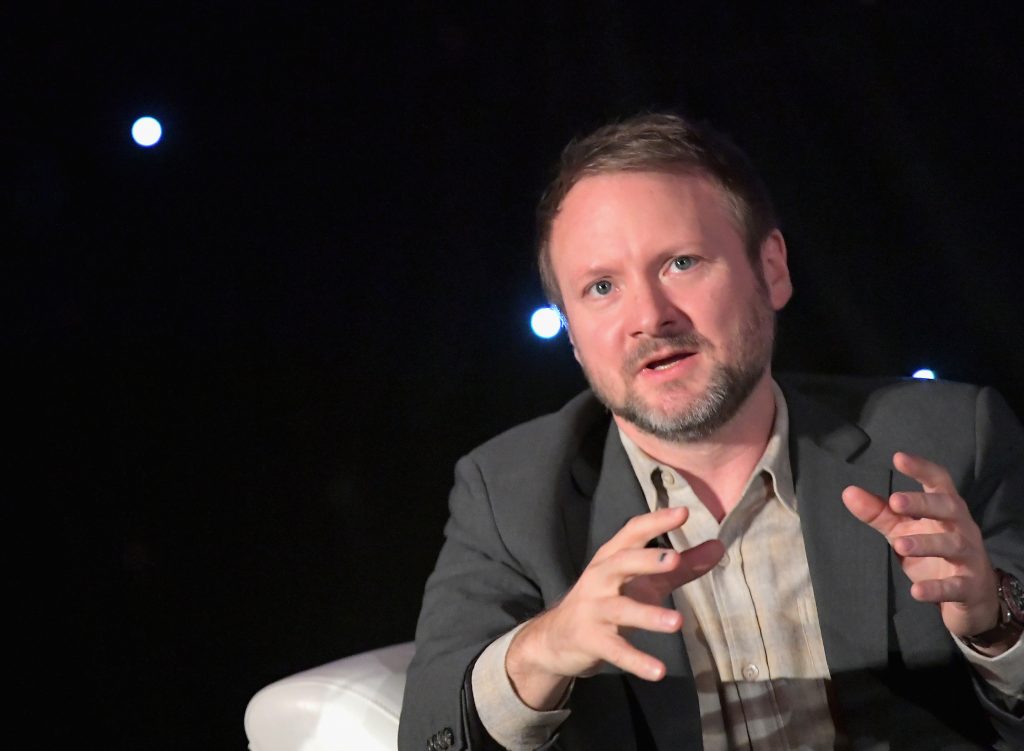
RIAN JOHNSON: Well, I – and first of all, thank you guys for all coming. This is very, very exciting. So yeah, it’s a second movie in the trilogy and I think we’ve been kind of trained to expect it’ll be a little darker and obviously it looks a little darker and the thing is though for me I loved the tone of the original films and also that J.J. captured in The Force Awakens of fun, and that’s like to me it’s a Star Wars movie, you know, first and foremost we were trying to make it feel like a Star Wars movie. And that means you have the intensity and you’ve got the opera, but it also means that it makes you come out of the theater wanting to run in your backyard, grab your spaceship toys and make them fly around, you know, and that’s a key ingredient to it. So we’re going to go to some intense places in the movie but I hope also it’s fun, it’s funny. I don’t know, you’ve seen it.
ANTHONY BREZNICAN: Yeah, you guys have seen it. Well, for some of the cast who was in The Force Awakens, how would you say this film feels differently?
MARK HAMILL: My answer will be in direct proportion to the amount of screen time I have.
JOHN BOYEGA: I just think the story’s moving forward. I just feel like J.J. had a blueprint, a foundation of Force Awakens that was pretty good and now it’s about – hey, it was, it was good – and now it’s about, you know, moving forward with the story and just challenging the characters and then all the characters are under intense pressure, and so it’s a time which everyone has their own specific reckoning, and it’s all different. It’s like a lot going on. I’ve only watched it once and the first thing is that I want to watch it again because of the amount of information and Easter eggs in there as well.
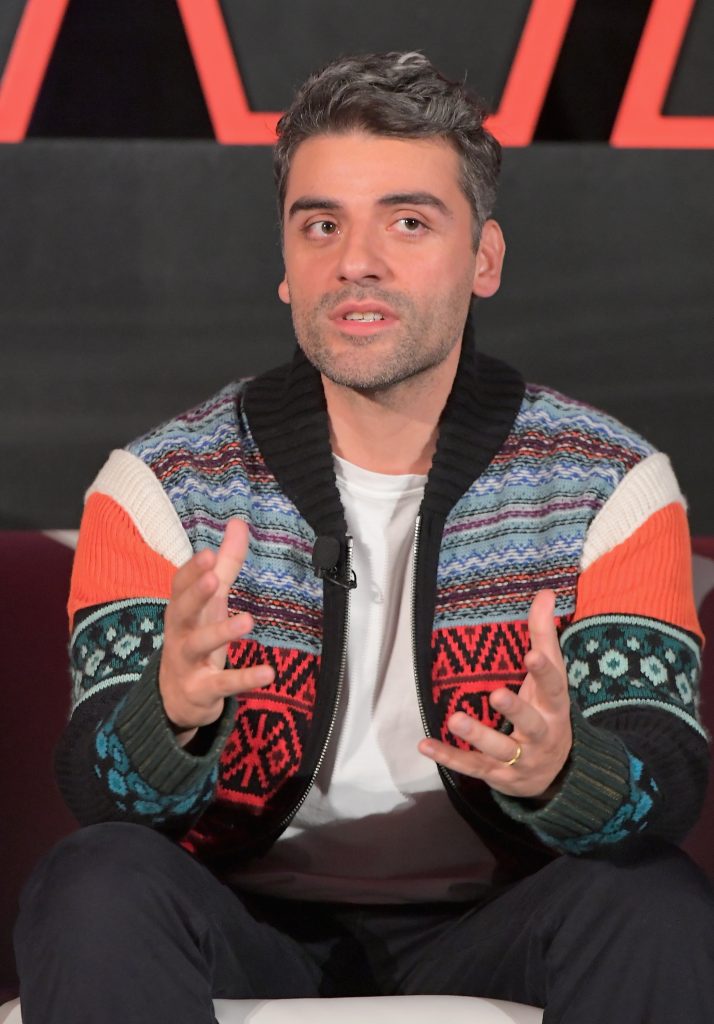
Oscar Isaac
OSCAR ISAAC: Yeah, I think the thing as well is that often with the second chapter in a story of three, because the first one kind of sets the tone and the world and the new characters, introduced them, in the second one you don’t have to spend so much time doing that, you can really just delve into the story, into what’s happening, like John said, to the conflict of each of the characters. I think what Rian’s done so incredibly well is that he’s challenged deeply every single character, including the droids, you know, with like the biggest challenges they’ve ever faced, and that’s how you’re able to really get to learn about them, on all sides of the spectrum, from light to dark. You know, it’s like he’s found a way to get to the central point of that character and try to challenge them as best as he can. I think it’s really amazing what he’s done.
DAISY RIDLEY: I mean, the biggest thing for me when I read the script, because you know, even though you’re trying to avoid what people are saying, it’s hard to, and because people responded well to John and I as a team, I was a big nervous about not being a team so much in this one. So I think for me personally it was a challenge. The film was a challenge and I don’t know what it was like for anyone else, but to be in different combinations of people. So in itself, we’re in different situations, we’re with different people that we are learning about, we’re meeting for the first time, so yeah, felt pretty different for me.
ANDY SERKIS: I mean, I was blown away when I saw the movie. I just was so caught up with it, not least because it was really intimate and very emotional and I wasn’t expecting that at all. I mean, I know obviously that it was going to go that way, but it was very, very powerful and it touches you and what Rian’s done incredibly is make this dance between the – you know, [SOUNDS LIKE] tonally dance, you know, between these great epic moments and hilarious antics, you know, literally flipping on a dime and then going right into the heart of these beautiful characters, and you really caring. And I think that was, for me, I think has been, you know, that was my takeaway, it was just an extraordinary viewing, you know.
GWENDOLINE CHRISTIE: I was delighted by the film and what I was surprised by was that Star Wars has always been – I think the reason why it’s resonated with us all so deeply is that it’s our foundation story of good against evil, and where that balance is, and how we see elements of characters we’ve never seen before, things that can be unexpected. But there is something about this film and I think it’s because the world that we live in is a changing and evolving place, that it retains the simplicity of those elements, but it really resonates with what it is to follow your own human dark narcissistic tendencies, where that will take you, and I love that, and it’s done so beautifully aesthetically too.
DOMHNALL GLEESON: I didn’t go to the screening. I wanted to wait and see it with a huge crowd and see it then the way I saw The Force Awakens which was just with a load of people losing their minds. But then I heard these guys lost their minds, so I was kind of annoyed I didn’t go.
ANTHONY BREZNICAN: I’d like to talk to some of the newcomers to the Star Wars universe, and that includes you, Rian. You’re the boss but you’re also the new kid in a way coming into this film.
RIAN JOHNSON: I’m like the new boyfriend at Thanksgiving dinner.
ANTHONY BREZNICAN: Well, we don’t know a whole lot about Admiral Holdo, but we know she’s kind of the new boss. She’s a new leader in the resistance. Is there a little bit of you in Admiral Holdo?
LAURA DERN: Very much so.
RIAN JOHNSON: Laura Dern could represent any part of me in life, I would be thrilled. Yeah, Holdo, I mean, Laura, I’ve been wanting to, you know, it’s a dream just to get to work with her. And the character that she plays in all of its glorious purple-haired wonder, we were really able to dig in and do some really exciting, fun stuff. And Laura, I know that like the moments on set where like suddenly you would like catch my eye and you would say, this feels like we’re making an independent film, like those were the moments that I was like, yeah, it kind of does, and I think that feels really good and that kind of intimacy of the process, I think. I don’t know. If Laura Dern’s telling you that, then you might be on the right track, I guess. But yeah [INDISCERNIBLE].
ANTHONY BREZNICAN: Well, Kelly and Laura, I mean, I know you’re there to do a job and be professional but is there any part of you that geeks out a little bit when you start working on a Star Wars film?
LAURA DERN: Every part.
KELLY MARIE TAN: Every part. I’m trying not to cry right now ‘cause this is so weird and different. Yeah, I feel like Rian has said this before but it definitely feels like you have to find a way to just do the work and kind of block everything out, but then C-3PO comes up and you’re like oh, [SOUNDS LIKE] god. So you’re constantly figuring out how can I figure out how to work in this environment and then you’re like, but also this is awesome. So it’s kind of a balance, right?
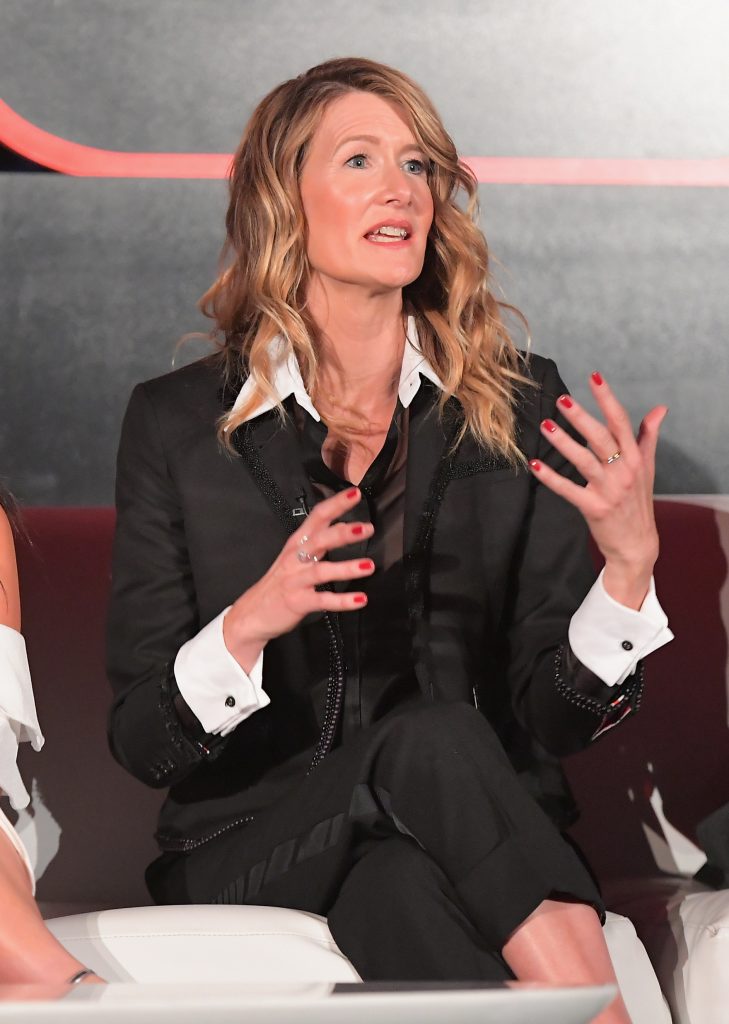
Laura Dern
LAURA DERN: And just to add to that, what Rian spoke to, that he does so beautifully as well as Andy was describing the intimacy of discovering each character’s conflict, which is just extraordinary, given the enormity of the cast, that he gave us that in the experience of the workplace, and it was shocking, and Oscar and I always talked about just how stunned we were that we were in such a massive environment and did feel like we were, you know, making a indie movie and you were always encouraging us to try things and explore character, and explore this duality of the light and the dark within characters, the movie speaks to so beautifully, not just that there are alternative universes but that that lies within, which seems to be the place that George Lucas first started the mythology of that, and it’s just so brilliant. And a group of us sitting together watching it for the first time was amazing ‘cause it was like we were with 3,000 people. We were screaming, standing up shouting, crying.
ANTHONY BREZNICAN: I want to ask Domhnall and Adam about your two characters, Hux and Kylo Ren, had a really interesting relationship in The Force Awakens that I understand is expanded on in this movie, where Snoke sort of plays them against each other, they’re allies but not really. I wondered if you two could talk about their bond or lack thereof, as we enter this film.
ADAM DRIVER: I think it’s definitely there’s a competition and it’s maybe yet to be discovered where that comes from. If anything I think that’s more of a testament to kind of what everyone has been saying of Rian’s inability to not mind a character in every moment, which seems like an obvious thing, but he doesn’t so he knows that spectacle, it won’t mean anything if you don’t care about anything that’s going on, which again, seems very obvious but I think it’s a really hard thing to balance with this many moving parts in the scale of something like this. So I love playing those scenes, especially with Domhnall, ‘cause he’s a great actor and there’s nothing is kind of taken for granted where, you know, oh, this happens and it moves on. If anything, Rian slows the pace and there’s not a moment that’s taken for granted. It’s always broken up into little pieces and the story in our mind comes first before an explosion.
ANTHONY BREZNICAN: Is there like a corollary in our world to the relationship that they have?
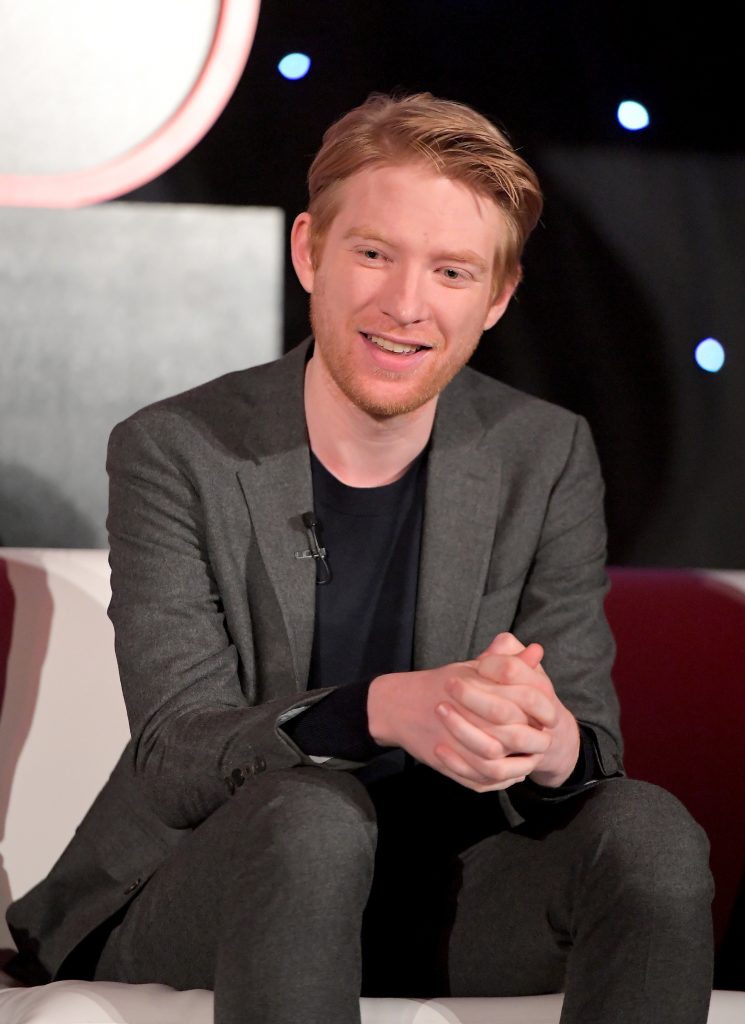
Domhnall Gleeson
DOMHNALL GLEESON: That’s dangerous water. I don’t want to do it.
ANTHONY BREZNICAN: Like rival coworkers or brothers?
DOMHNALL GLEESON: Oh I see. I don’t know. I think it’s funny, you know, like there’s just such a huge amount of drama going on in that group of people but then also just a huge amount of bitchy infighting as well, which I think is really fun to see them kind of really hurt each other from the inside as well as from the outside, you know, the united front thing is difficult for them sometimes. But it was just – yeah, I’m not good – sorry, I think, it’s such a privilege to be in the film.
ANTHONY BREZNICAN: That’s very good. I think we’ll open it up then to the audience for some questions and just raise your hand, we have some microphones that are going around, and I’ll try to call on as many of you as we can get. There are lots of folks out there. Let’s ask this gentleman right here, with the goatee, yeah.
My question’s for Mark Hamill. With Luke training Rey in this movie, it seems like he’s in the position Yoda was with Luke in The Empire Strikes Back. Is it sort of like when your parents say you’ll understand when you’re older? Does he finally learn some of Yoda’s lessons now that he’s the teacher?
MARK HAMILL: Well, you’re assuming that I train Rey.
DAISY RIDLEY: Exactly.
MARK HAMILL: Do I? I know. I have to be really careful. People say, was it difficult to pick up and wield a lightsaber again, and I go, do I pick up a lightsaber? I can promise you my part is twice as big as it was in The Force Awakens.
This question here is for Mr. Johnson. You had said that a lot of the visual cues for The Last Jedi were going to be taken from The Empire Strike Back. What aesthetic really spoke to you about Empire and what shot did you really want to replicate from The Empire Strikes Back?
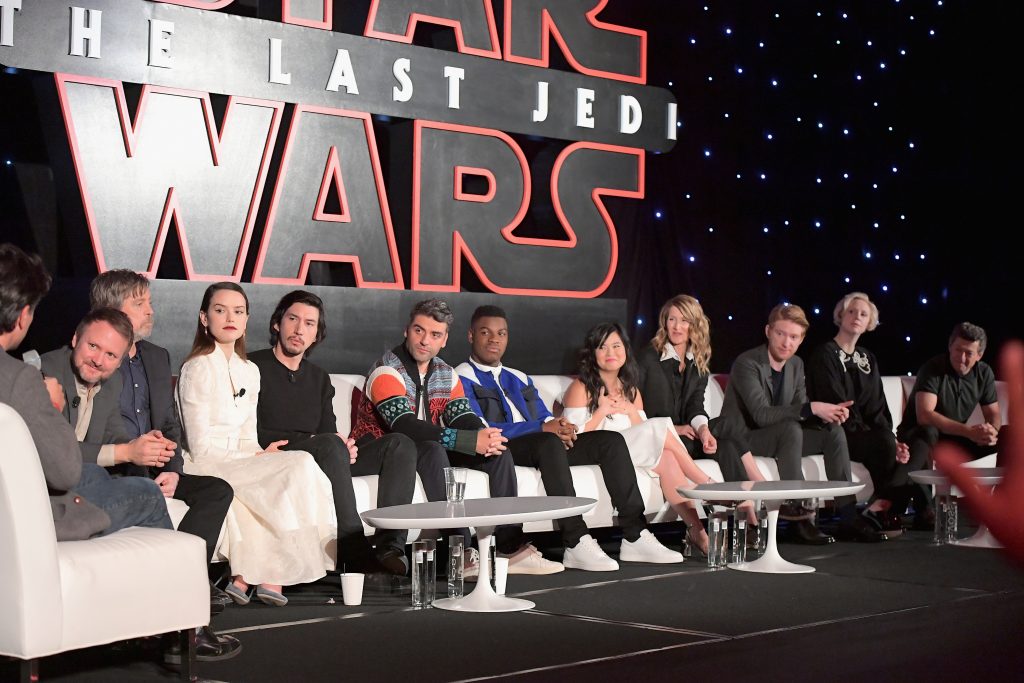
Rian Johnson; Mark Hamill; Daisy Ridley; Adam Driver; Oscar Isaac; John Boyega; Kelly Marie Tran; Laura Dern; Domhnall Gleeson; Gwendoline Christie; Andy Serkis; Anthony Breznican
RIAN JOHNSON: Yeah. Well, I mean, my cinematographer Steve Yedlin who I’ve been best friends with since I was 18 years old, we met in film school, and so to be standing next to each other on the Star Wars set was pretty surreal. But I mean, I think Empire is, you know, I think it’s just the most beautiful – I mean all the films are beautiful – I think for my tastes, I think the cinematography in Empire is the most gorgeous of the whole series. And so Steve and I looked at the lighting in that it’s also kind of the most – it’s pretty daring in terms of how dark they were willing to go with some of it – literally dark, and how gorgeous they went with some of the choices they made with the shaping of the lighting. But then in terms of like an actual visual aesthetic I made a choice very early on that I thought, well, I can either try and kind of copy my idea of what the original movies did, which was much more of kind of a formal, the camera didn’t move a ton and it was a much more formal type visual aesthetic, or I realized, you know, we’re going to take visual cues lighting wise and design wise from, you know, the previous movies, but I need to just shoot this movie the way that I would shoot a movie, because at the end of the day, if I’m not engaged with it, and I’m not trying to tell the story the way that really makes me excited, then it’s not going to be up there on the screen. So I kind of cut myself loose camera movement wise and shot wise from trying to imitate the past and just try to tell the story as excitingly as I could up on the screen.
So there are way more female characters in this move, certainly in the first three movies. That’s going to mean a lot to little girls. I want to know what it means to you guys.
DAISY RIDLEY: I think like as a girl growing up in London, obviously I knew there was a disparity in films but I wasn’t so aware of it, like growing up in a liberal household. I was never really made to feel any one way. So when I got involved I didn’t really – like, I knew it was a big deal, but the response was so beyond anything I could have imagined, that I’m still like – it was only afterward I was like, oh, oh yeah. And it’s not like I ever took it for granted or anything but it was just so monumental, the response and how people felt about it, and obviously that’s a testament to Kathy, J.J., Michael, Larry, everyone who created the characters in the beginning, and I think what’s great about everyone is it’s not like she’s a girl, this is a guy, this is anything, everyone’s just, it’s just great characters that happily are falling into broader categories now, so I’m thrilled. Yeah.
KELLY MARIE TRAN: Yeah, I agree. I think that it feels like both an honor and a responsibility at the same time. I feel like from the beginning when I initially found out I got this role, I just felt like I wanted to do the whole thing justice, and I’m so excited that guys, the girls in this movie kick some butt. Every single one is so good, and I can’t wait for everyone to see it. Yeah.
LAURA DERN: I just want to pay tribute to Rian for being one of the most brilliantly subversive filmmakers I’ve ever been able to bear witness to, and in the case of the look of my character, I was moved by the fact that he really wanted her strength to first lead with a very deep femininity and to see a powerful female character also be feminine is something that moves away from a stereotype that’s sometimes perceived in strong female characters must be like the boys. I thought that was a really interesting choice to get to witness.
GWENDOLINE CHRISTIE: I was so delighted. I wasn’t cast in the first Star Wars film yet when I heard about the casting, and I was utterly delighted to see that there was a more representative selection of actors that were going to be in these incredible Star Wars films, and that has continued. And you know, everything that my amazing colleagues say is absolutely right. You get to see women that are not being strong just because they’re acting like men. They’re doing something else. And also you’re seeing a developed character or at least a developing character, that’s showing some complex character traits. And I’m just delighted about that. I’m delighted that something as legendary as Star Wars has decided to be modern and to reflect our society more as it is.
This question goes out to Daisy, Adam, John, and Oscar. Last Force Awakens, you were the new kids on the block. You had Carrie, Harrison, and Mark to set the tone and lead the way for you to step into these roles. You guys are now leading the way for the next generation of actors to come into the Star Wars world. How much – did that place any kind of onus on you and any sense of responsibility in addition to that, inherent to your performances?
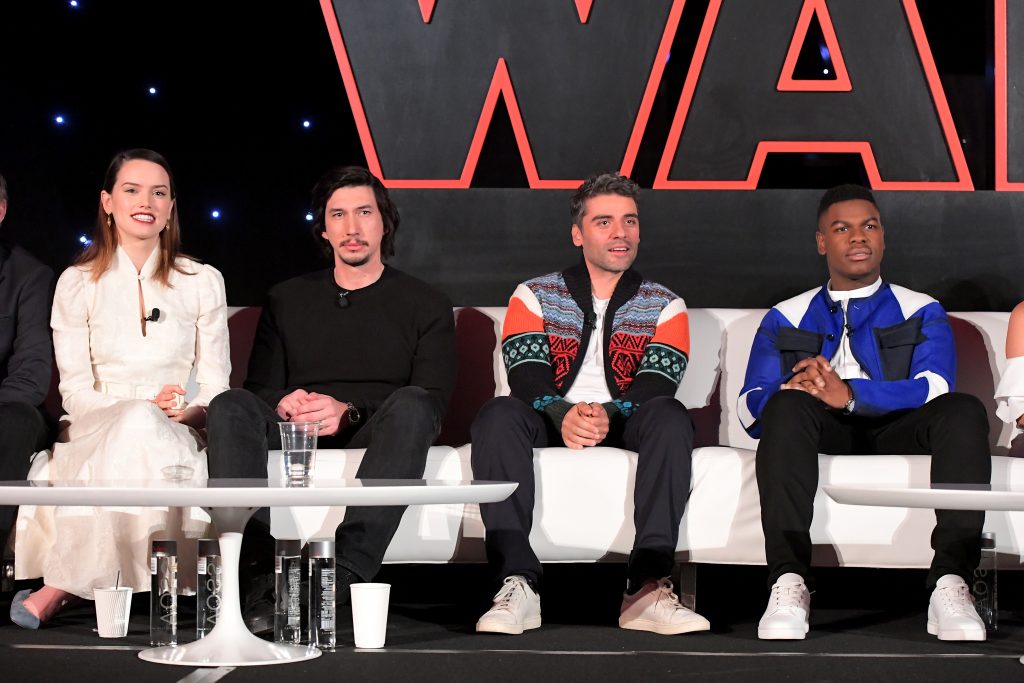
Daisy Ridley; Adam Driver; Oscar Isaac; John Boyega
ADAM DRIVER: No, I don’t think so in that the lesson that I learned from the first one from Mark, Carrie and Harrison is not so much telling you and other people that I’ve worked with, it’s not telling you what your experience is going to be because we’re all different and we see the world differently. That’s kind of an obvious thing, but kind of similar to almost the question before. It’s hard to impose an idea on someone that you kind of don’t know. I think it’s everyone’s relationship to – certainly within them I would imagine is different, and that’s kind of for them to discover, and it’s almost more generous to, you know, give someone space, to make it personal to them. I’m not really sure what that means, but [SOUNDS LIKE] what more, that they weren’t kind of let me tell you what it’s going to be like, ‘cause no one really knows, and I think that they would say even for them coming back to the movies, to this movie, after so many years, that I think they, I mean, maybe Mark can speak better to this, that even they have to figure out what it means to them. So I think they’re kind of lead by example people, that’s kind of what I’m avoiding saying ‘cause it’s so cliché, but it’s more powerful I guess when you see it in action. So I think that none of us took it upon ourselves to tell people how it was going to be for them because we’re not them, you know.
OSCAR ISSAC: I don’t know that it affected our performances in any way.
ADAM DRIVER: I think everyone was just as equally terrified to figure out what we were doing and make sure we were looking at space.
We watched it through the eyes of R2-D2 and C-3PO, through the droids. And obviously here we’ve got R2 and 3PO and BB8 and BB-9E, so do we continue to see the story through the eyes of the droids or are they just passengers on this adventure?
RIAN JOHNSON: It’s different, and it was different in The Force Awakens, it’s different in this also. We don’t quite have so much the hidden fortress, kind of worm’s eye view of the story that we started within those movies. And with this, yeah, different story, had different needs, and so we are much more kind of with our leads the whole time.
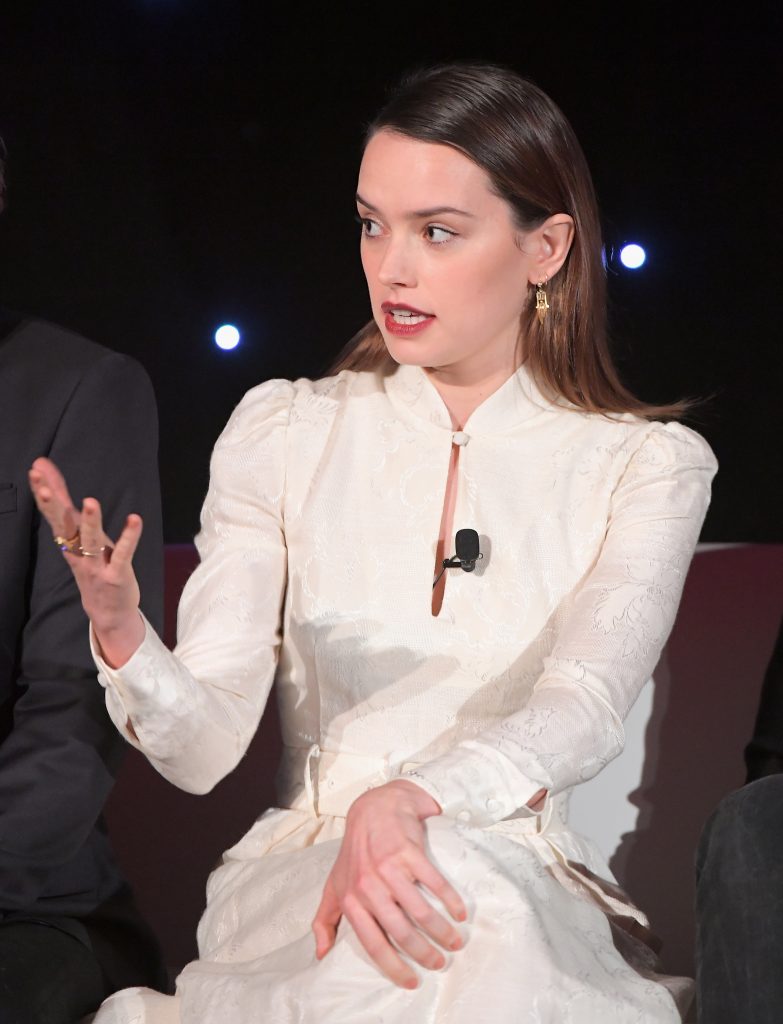
Daisy Ridley
DAISY RIDLEY: I’ll just quickly add what I think is amazing about the film, is that every character – I like don’t have a big film knowledge or anything, so I’m not oh, god, this is – so I never understood the structure of what the Star Wars was and what anyone was trying to fulfill, so just as me watching it, I think you really follow the story ‘cause you’re with every character, like everything you need to see is happening on screen, you’re not seeing things happen off screen, that have happened off screen, so people asking questions on screen, they’re getting answers on screen, they’re having their adventure on screen, so you’re with everyone every step of the way. So how the story’s unfolding. And I think it makes for compassionate viewing because you’re really understanding both sides, why people are doing the things they’re doing, and how it’s being fed from everywhere and how things collide and the consequences of people’s actions, how they’re directly affecting other people.
ANTHONY BREZNICAN: I don’t know if it’s so much a moral of the story, but Rian, one of the things that you and I have talked about is that a theme that’s throughout the movie, all the different storylines, is the perils of meeting your hero and living up to expectations Is that one thing that maybe connects to her question?
RIAN JOHNSON: That’s definitely one of the things, yeah, in it. You know, I think these movies to some extent are always about, I don’t know, to really boil it down, you know, if you look back at Lucas kind of, you know, famously drawing from The Hero’s Journey myth that Joseph Campbell wrote about, and the hero’s journey is not about becoming a hero, it’s not about becoming Hercules, it’s about really adolescents, it’s about the transition from childhood into adulthood, and finding your place in the world, and you have these new powers that you’re feeling inside yourself for the first time, you don’t know what to do with them, you don’t know who it is you’re going to get help from, who’s going to be unreliable, who’s not. Navigating those very tricky waters that we all have to navigate, that’s why it’s so universal. So part of that is, you know, your relationship to heroes and people you thought were your heroes, people you don’t expect to become your heroes. And that’s definitely something that plays out in this film.
ANTHONY BREZNICAN: Do you have any thoughts on that, Mark, having played the young farm boy who becomes a hero and now returning to that character all these years later, what journey, without obviously giving it away, but what arc is left for a guy who’s been through what Luke Skywalker has been through?
MARK HAMILL: I don’t think any line in the script epitomized my reaction more than this is not going to go the way you think. And Rian pushed me out of my comfort zone as if I weren’t as intimidated and terrified, to begin with, but I’m grateful because you have to trust someone and he was the only Obi-Wan available to me, not only in my choices as an actor but my choices in sock wear. Because – well, I was so embarrassed. I looked at my drab black socks and I said, curse you, Rian Johnson, I’ll get my revenge.
RIAN JOHNSON: You have learned well, young padawan.
How is it different than any of the other movies?
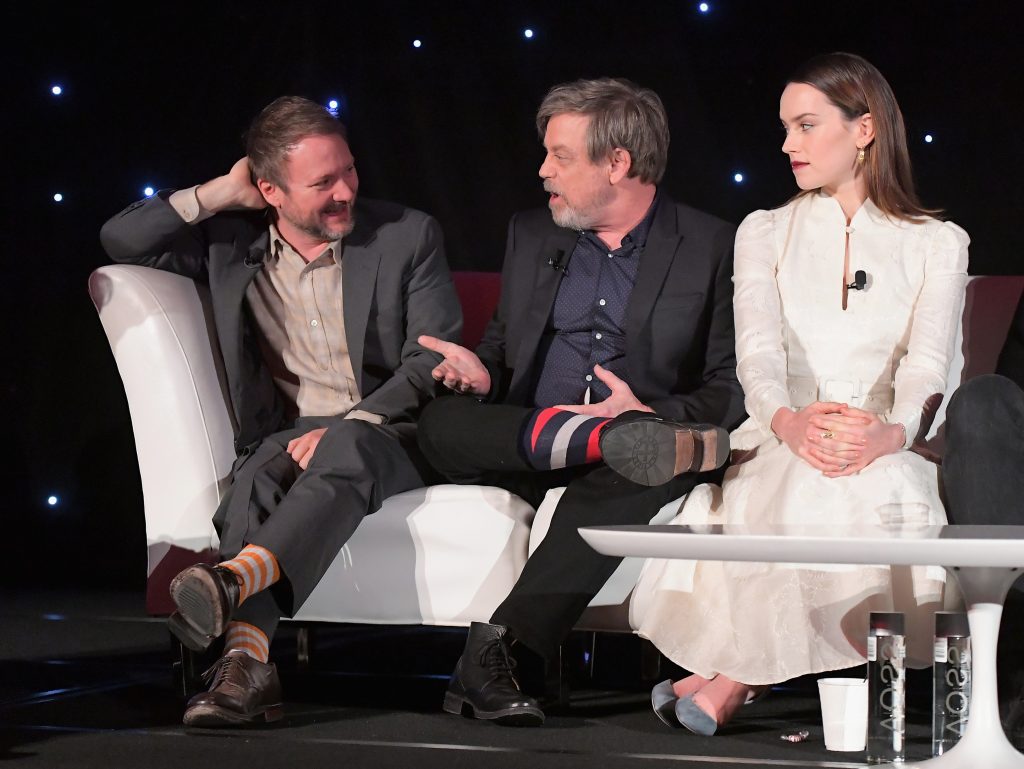
Rian Johnson; Mark Hamill; Daisy Ridley
MARK HAMILL: It’s longer.
RIAN JOHNSON: Not much longer.
I’m not asking for spoilers or anything, but just how did it feel different?
DAISY RIDLEY: As an actor, I would much more easily draw a comparison of similarity, ‘cause like I mean, I’m sort of just speaking for me, that I was like really new to this all, and it was first film and all that sort of stuff. And I’ve done smaller films now this year, and I’m like, genuinely it feels the same, like the sets tend to smaller, were shot in Prague instead of London, but like it genuinely it’s a small – not a small feeling, but it’s like that family thing, so going into something could have been really scary and being surrounded by people that make it feel really comfortable for me is like the only thing you can ask for. ‘Cause you can only do what you can do. If you’re in a really safe environment, then you’re able to do more. And coming back like it really felt – it was different obviously in ways ‘cause the story’s different, the characters are being challenged in different ways, but the crew was similar. I think it says a lot about Rian and our first, Jamie, actually, like how a set is run is so incredibly important, and what J.J. and Tommy did the first time around, Rian and Jamie did this time, it’s just a really happy set, that everyone feels, I think, heard and respected. And so just like in an acting sense, taking everything away, I think the same feeling was captured of love and of everyone trying to work together to make this thing that hopefully other people will love. So I think to me, in a more emotional way I think it did feel more similar than different.
Rian, you’re a fan. At that moment, whether it was in the screenwriting process or shooting something, did you feel your transition from fan turn into ownership?
RIAN JOHNSON: Oh, I keep waiting for that moment to happen. [OVERLAPPING] Even standing up here, I see the big Star Wars behind me and I’m like, well, do I belong under this? Yeah, it feels very – there’s no like Eureka moment where it’s like now, I’m doing it. You’re always riding that line between feeling like you’re a fan who snuck in the back gate and is getting away with something, which I think is probably a good thing. I’d be curious to hear John, just because you’re the biggest fan I know in the world.
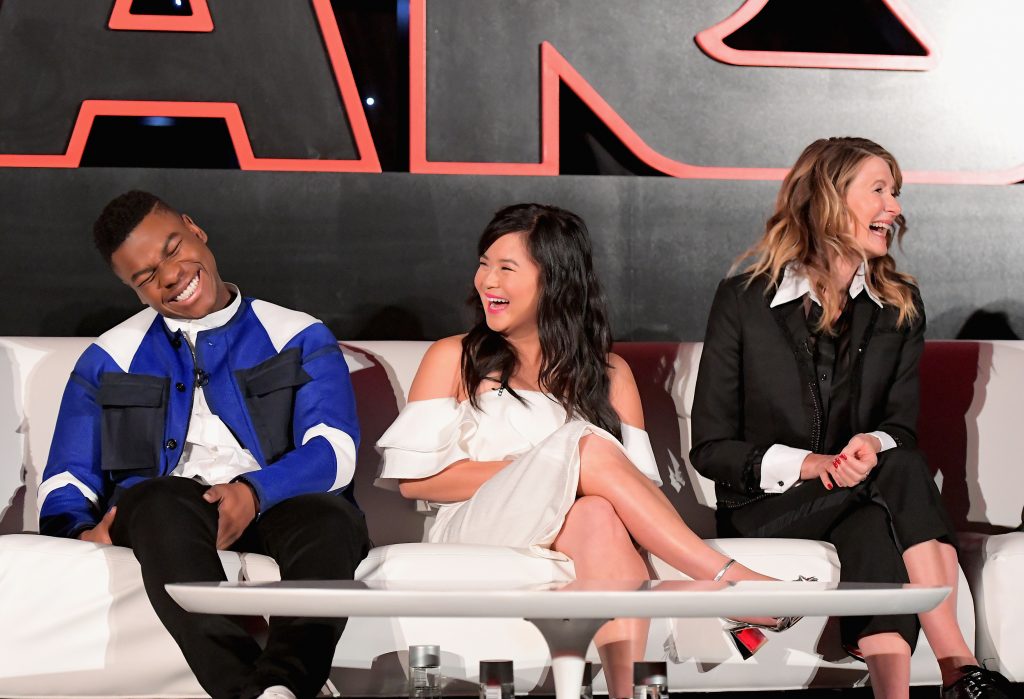
John Boyega; Kelly Marie Tran; Laura Dern
JOHN BOYEGA: I’m still trying to get over it. I can’t lie. Because I think what we forget is that when we filmed Force Awakens it was about two years between before we started on Last Jedi, and we went obviously to do other stuff, and then when you come back it just feels like you’re back in school, you know, and it’s fun. Every day was a new set. The practical effects I think like doubled in this movie, the sets were bigger and it’s always exciting and amazing, but as everybody has said, you still feel an intimacy when you’re doing these scenes, you know, and independent with a big budget, you know.
KELLY TRAN: Big ass budget.
JOHN BOYEGA: A big ass budget.
LAURA DERN: I love, Oscar, how you described yesterday all of us watching the roll at the top as the lights went down, and even though all of us feel giddy that we’re excited about being part of this, suddenly you’re an obsessed fan, regardless.
Obviously, the death of Han Solo is a huge moment in The Force Awakens, and I’m wondering how impactful is that, without spoiling anything, to the characters who knew him in the last movie and the previous films?
JOHN BOYEGA: I think we’re just keeping it moving, to be honest with you, man. It’s true, the pressure’s on man, you know, there’s no time. I think that’s the one thing that’s unique to me about watching this movie was just the commentary on war. I think there hasn’t been a Star Wars movie yet that has explored war in the way The Last Jedi does. It’s very messy, the categorizing of good and evil is all mixed together, so you know, in terms of Han, there’s no, you know, I’m sure we all feel sentimental if someone was to sit Finn down or sit Rey down, but Rey’s off training, she’s got stuff to do. I’ve got back injury, I’ve got stuff to do. I can’t think about Han at the moment. He died, so.

Daisy Ridley; Adam Driver; Oscar Isaac; John Boyega
OSCAR ISAAC: I mean, I think it’s reverberating but he’s right. You know, it’s a dire situation, it’s critical. The resistance is on its last legs. You know, they’re trying to survive. First Order’s right on top of us. You know, it is like war, where you go to just keep moving to try to survive, and so you feel I think the momentum of everything that happened in The Force Awakens just pushing and getting to a critical mass in this film.
DAISY RIDLEY: I will interject here, and I think this is the beauty of having storylines that are sort of happening in tandem and affecting each other, ‘cause I would say that Rey at least is very much affected by it, and I think like in the What did I say? What did I do? In the first – like, Rey, as a character has been alone for a really long time and she’s really open to like love and friendship, so Finn and BB-8 come along and it’s like this amazing adventure. And then Han, like without trying to, she seeks something from him because there’s an intimacy and there’s a sort of figure of something she’s never dreamed of for her, that gets, you know, snatched away, and she’s understanding everything’s new to her, so she’s understanding things in a different way, and luckily for me, ‘cause I was trying to get to grips with everything going on, and then Rey’s trying to get to grips with everything going on. So for Rey at least there is some time. Everything’s moving forward but she has some time to ask questions and wonder what it is that would have led someone to do something like that, and also how that directly affects the world around her, ‘cause yeah, and then you know, she’s worried about Finn at home, so I would say she’s maybe a little more affected, at least emotionally on screen than the others.
OSCAR ISAAC: An interesting thing, going back to one of the things about the question about the strong women in it because think as a guy I’d like to say that for me the most formative people in my life have been women. And so that has shaped my destiny so much and so to see that reflected in the film is really, really a beautiful thing, and it does, it is truer to real life and what’s happening now, but what’s always happened which is, you know, they’re the ones, you know, that shape you.
ANDY SERKIS: Well, speaking as the leader of the First Order, I would say that Snoke is very unimpressed with the fact that there is such a huge female force that seems to be growing in the universe. It’s deeply threatening, it’s deeply undermining, it’s got to be stopped, it cannot go on, and this we see – without giving too much away – a little snatcho in this movie.
For a long time when I was growing up, there was really only one character, and that was Princess Leia and now General Leia, and of course Carrie Fisher isn’t here with us today except probably in spirit, giving everyone the finger from back there. But I wanted to ask the women in this film about the impact that Princess Leia had on generations of young girls who were watching these movies, even though there wasn’t a whole lot of variety for them. I think this is a character that spoke to them and Gwendonline speaking as one of the idols of the bad girls, as Captain Phasma, what role did Leia play in your life as a young Star Wars fan?
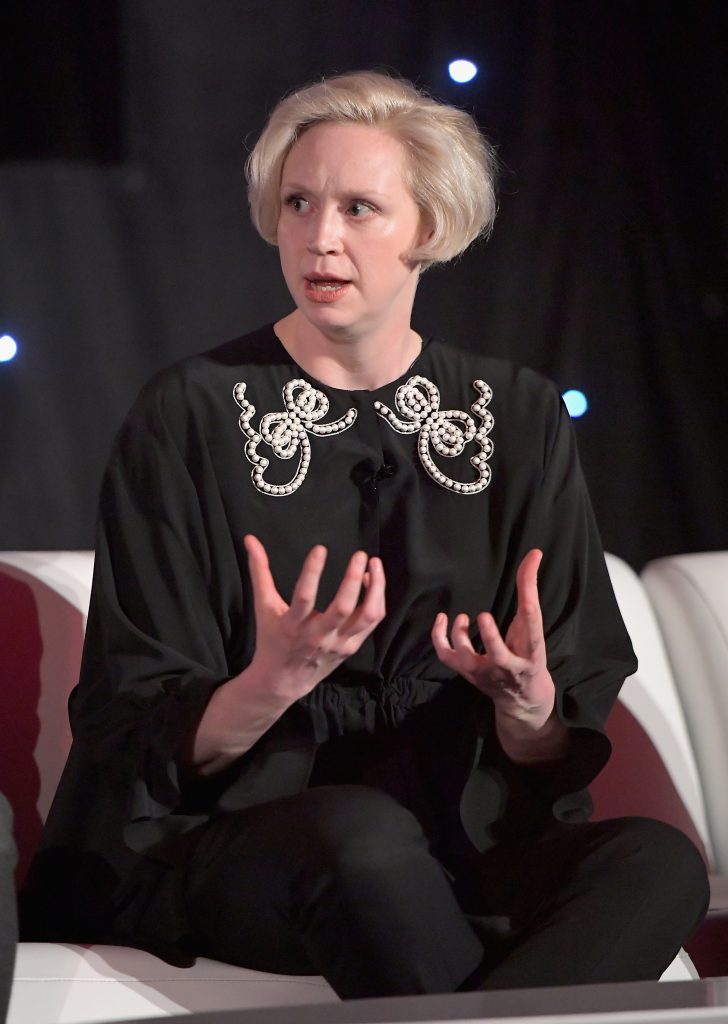
Gwendoline Christie
GWENDOLINE CHRISTIE: Well, she was very significant because I was first shown A New Hope when I was six, and I remember thinking, wow, that character’s really different. I watched TV and film obsessively from such a young age but it stayed with me throughout my formative years, of she’s really interesting, she’s really smart, she’s really funny, she’s courageous, she’s bold, she doesn’t care what people think, and she isn’t prepared to be told what to do. And she doesn’t look the same as a sort of homogenized presentation of a woman that we had been used to seeing. So that was really instrumental to me as someone that didn’t feel like they fitted that homogenized view of what a woman was supposed to be, that there was inspiration there, that you could be an individual and celebrate yourself and be successful without giving yourself over, without necessarily making some sort of terrible, huge compromise. So it was a big inspiration for me. And you know, to play a character as well from what we’ve seen in The Force Awakens, I was very excited when I was shown just the basic element of the costume, and here we were seeing character whereby a woman wasn’t – her femininity was not delineated in terms of the shape of her body, in terms of her physical attractiveness. Those elements, that weird random group of elements which we’re born with in some kind of odd lottery and then we’re judged on in society. And I was just delighted to be able to have that opportunity.
LAURA DERN: Well, endless thoughts and also you know, a profound impact that she made on me as a girl, and spoken so beautifully by Gwen, so I’ll just speak to this present experience, to say that as we always had with Carrie, not just Leia, her wisdom, and you know, people speak about people who are brave or fearless, but beyond that, I’ve known luckily a few people that would hold those descriptions, but not that they would be without shame, and that’s what moved me the most about the icon she gave us, but also what she gave us individually and personally which is to Carrie, who she was so directly and to be without shame, and to share her story, and to expect nothing less from any of us. And the privilege of watching how Rian has so beautifully captured all of that and her grace in this amazing, beautiful, pure performance, but also I think she found an equal irreverent subservience and they had this dance that gives us this performance that I was just so moved by.
DAISY RIDLEY: I don’t think I can really follow that, except to just say Carrie’s daughter Billie is I think all of those qualities. She’s smart and funny and shameless and wonderful. And I think Carrie bringing up a daughter obviously with Brian, bringing up a daughter who is all of those qualities and then some, in this world, if that’s what she did, you know, just her being her, I think it speaks volumes to what she did as her in the spotlight and also her as Leia.
KELLY MARIE TRAN: Yeah, I mean, I agree with everything that was said. I think that something about Carrie that I really look up to is, and something I didn’t realize until recently, was just how much courage it takes to truly be yourself when you’re on a public platform or when possibly a lot of people will be looking at you. She was so unapologetic and so openly herself and that is something that I am really trying to do, and it’s hard. And just like Daisy said, like Laura said, like Gwendoline said, I think that she will always be an icon as Leia but also as Carrie. What an example, you know? And I am so fortunate to have met her and I think that she will really live on forever.
STAR WARS: THE LAST JEDI (11/3/17)
Facebook | Twitter (#TheLastJedi)| Instagram | YouTube | StarWars.com
I was invited by Disney to take part in #TheLastJediEvent to share my experience with my readers. All opinions are my own

- You Have to Remember – 9/11, 20 Years Later - September 11, 2021
- Creating the Perfect Look with a Maxi Dress - October 20, 2020
- Brand Better Giveaway - October 6, 2020


Leave a Reply